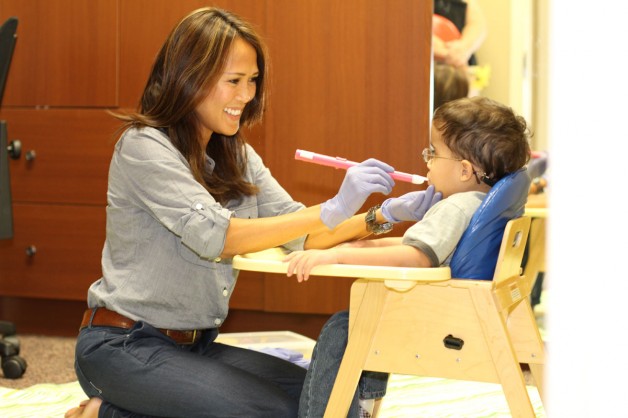My Child Has An Appointment at the Speech Clinic – What Can I Expect?
Image Courtesy of www.wiu.eduSpeech therapy is offered through many different settings – in school, through in-home services, early childhood education, and private speech clinics. If your child has an appointment at a speech clinic for the first time, you might be wondering what to expect. Although each clinic and speech-language pathologist (SLP) will have their own ways of assessing your child and planning any speech therapy that is needed, there are some general steps that are quite common (and helpful) to take during that first appointment.
What to Expect at the Speech Clinic Appointment
Image Courtesy of www.spinept.org
Completing Paperwork
There will be forms to complete – from insurance to family health histories. If you haven’t received these forms already, contact the clinic where your child will be receiving an evaluation or beginning therapy and ask to have them sent to you ahead of time. This can be especially helpful if your child is younger, has other health or behavior needs, or if the paperwork is extensive. Many parents struggle in a waiting room, facing the pressure of accurately and thoroughly completing these important parts of records while knowing that at any moment their child’s name will be called and that important paperwork just gets shuffled to the background. If the paperwork can’t be completed ahead of time, consider the following things that might be asked and make notes of them:
- Age when first sounds were babbled
- Age when first word was spoken
- Age when words were strung together
- Ages when your child first ate solid food, sat independently, crawled, and walked
- The fine and gross motor milestones your child has reached (or seems to be missing)
- The communication milestones your child has reached (or seems to be missing)
- The ages when your child developed independent skills (dressing, bathing, brushing teeth, toileting, etc.)
- Any surgeries or other medical conditions
- Family health history
- Insurance details
- Payment information
Reviewing Concerns
An important first step at a speech therapy appointment is to review the concerns you as parents have about your child’s communication. It can be overwhelming to remember everything you want to share with the speech-language pathologist, so create a small list of your concerns – and be sure to lead with the top 2 or 3 three most significant concerns.
Getting to Know Your Child
The appointment your child has with the SLP might not look like any other medical appointment your child has had so far. There likely won’t be any uncomfortable exam tables, and the room might look more like a small play area or living room than anything else. The initial goal of many SLP appointments with young children is to make the children feel as comfortable as possible. This will help them communicate to the best of their abilities. The rooms often have comfortable, child-sized furniture, games, toys, and books.
The SLP will likely just encourage your child to become acquainted with the room, especially if this is the first time your child has been to this speech clinic. This is an important part of the assessment process, even though it might not appear that there is any formal “testing” occurring.
Assessing Your Child
The assessments that the SLP will use will depend largely on why the appointment was made (those concerns you listed earlier). Some of the general areas of assessment might include:
- Articulation – including speech sounds and age appropriate milestones
- Motor speech capabilities – assessing abilities to move facial and mouth muscles, abilities for feeding, drinking, and swallowing
- Receptive language skills – assessing how well your child understands how others communicate with him/her
- Expressive language skills – assessing how well your child can use age-appropriate words and non-verbal communication to communicate clearly
- Other communication skills – assessing things such as age-appropriate reading, writing, and following directions skills
- Other delays or disorders – assessing how other disorders might be contributing to language problems
- Fluency – assessing things such as stuttering
Making a plan for treatment
Sometimes the SLP can make an accurate diagnosis during that first visit, especially if there is only one concern and symptom. Other times it might take several appointments and assessments to truly assess what might be the causes behind the communication problems. At your first appointment you can expect to either have further assessment appointments made to better understand the needs of your child, or you might be offered speech therapy services for your child. Sometimes you also might be told that it is best to wait until your child reaches certain other milestones before speech therapy should be reconsidered. You might also be given some activities to do at home with your child to improve education. Take notes, ask questions, and get the contact information of the SLP so that you can contact the clinic with any questions you think of after you leave the appointment.



